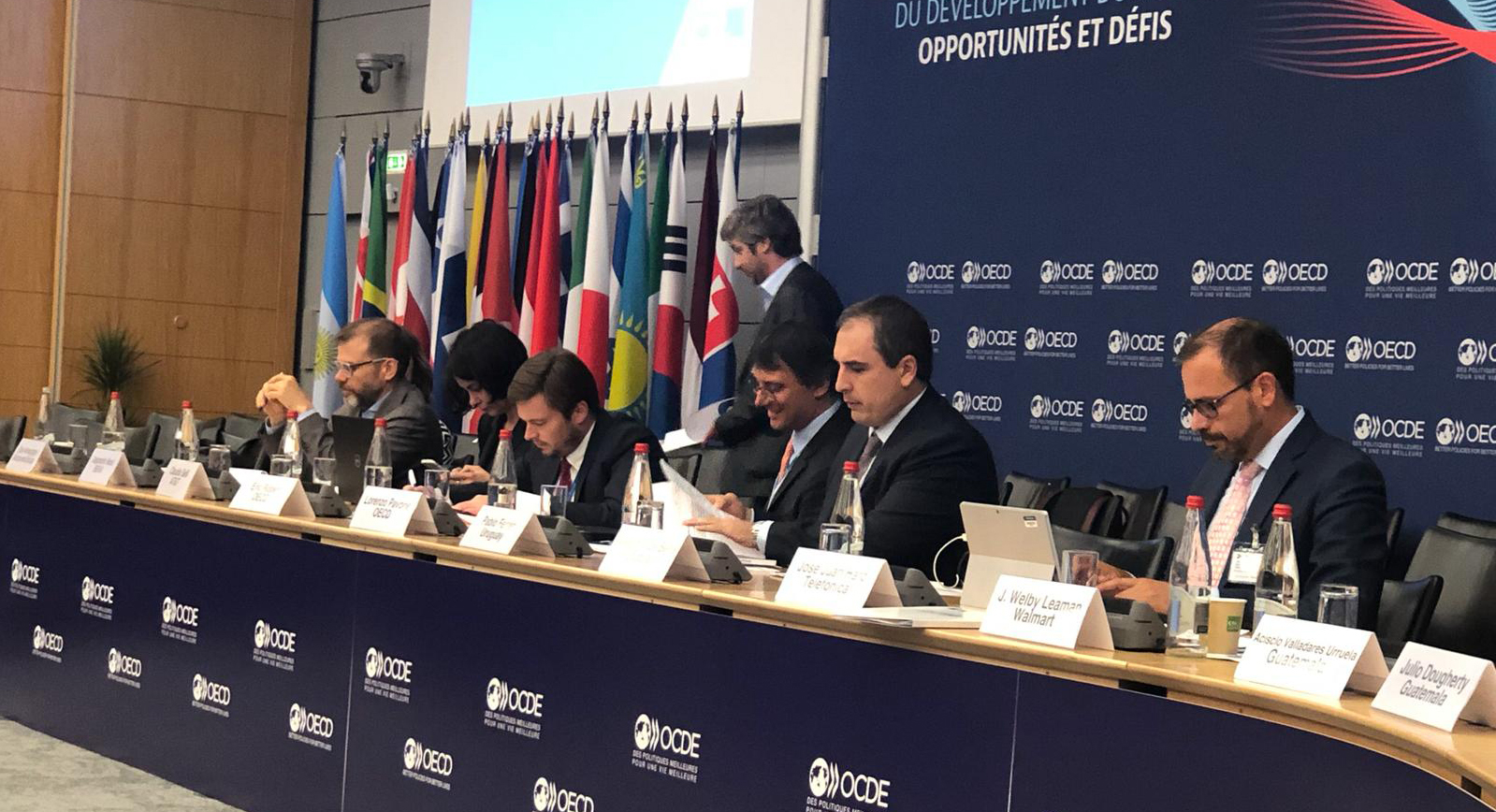Telefónica participates in “EMNET Business Meeting on Latin America: Leveraging the impact of new technologies” to share its vision on the connection between new digital technologies and tax implications. José Juan Haro (Director of Latin America Public Policy and Wholesale Business at Telefónica) together with Pablo Ferreri (Vice Minister of Economy and Finance of Uruguay) and Claudia Selli (director of European Government Affairs at AT&T) address tax challenges for policy makers, including VAT collection, corporate tax avoidance and allocation of taxing rights.
Digitalization is a key element of policy making and structural reforms in Latin America. Fiscal and taxation policies are as well at the kernel of the reform agenda. These policies are essential so that solid economic growth could resume in Latin America.

How can a fiscal policy consensus contribute to the growth of digital ecosystem in LAC?
At first glance, this question seems to imply that there is not any consensus regarding fiscal policy in Latin America. Unfortunately, that assert is far from real. At Telefonica, we believe a de-facto consensus has been built, at least in Latin America, in the years of economic slowdown. In order to balance fiscal budgets, Latin American Governments have increased the burden the telecommunications industry faces. Let just illustrate this trend with a few examples:
- In Ecuador, during Mr Correa government, some laws were enacted to approve the so-called “royalty regime” that in fact taxes telecom service revenues of providers that account for more than 30% of market share. That is, bluntly put, a tax on the size of telco companies. This tax adds to other regressive measures that reduce the incentives to expand connectivity, such as a spectrum regime that heavily increases costs to be paid to the Government for each additional base station been built. In 2017 the total tax contribution of the mobile sector accounted for 30% of the total market revenue in the country.
- In El Salvador, the social demand to tackle violent crime and Maras was solved in 2015 with the enactment of a new special tax focused on just a few industries to finance public security measures, the so-called Contribución Especial para la Seguridad, Ciudadanía y Convivencia (CESC), which is levied at a rate of 5% on the pre-tax value of telecommunication services and equipment.
- In Colombia, the tax reform of 2018 aimed, among other objectives, to generate additional fiscal revenues to finance the post-conflict strategy, included a net tax increase in services provided by telco operators.

This kind of movements could be found all over Latin America, while – at the same time – there has been an increase in spectrum costs that is not justified by the current financial situation of the telecommunications industry, that shows in recent times a decrease in revenues, margins, cash-flow and, a result of this financial trend, a decrease in total investment. So, the issue is not if a consensus exists or not. The issue is if the prevailing fiscal policy consensus is the right starting point to attract the additional investments that – as Federico and Dirk have pointed out – are much needed to make the Latin American digital ecosystem grow. We believe not. These are some ideas about how we believe fiscal policy should look like to maximize the potential of the digital economy in the region:
- A fiscal policy that promotes investments in digital infrastructure needs to be neutral in its approach. Every firm should pay taxes under the same rules, in line with their sales and the profits they make. A fiscal model that allows providers of digital services to pay less taxes (or not pay them at all) and at the same time puts a heavy burden on providers of digital connectivity would not achieve the objective of promoting the digital economy as a whole. This sort of policy may incentivise a sort term peak in investments devoted to digital services but without digital infrastructure, as the ITU points out, the social impact of digital services would be very limited. If access is one our biggest problems, as Dirk has rightly pointed out, wouldn’t it be right to equalize fiscal pressure by reducing taxes on digital infrastructure? To illustrate the gravity of the problem, it is enough to consider the findings of Columbia Business Scholl Professor, Raul Katz, whom in a study commissioned by ASIET and CET.la found that the telecommunications industry in Latin America supports 51% more tax pressure than other industries.
- A neutral fiscal policy needs to be based mainly in General Taxes. OECD reports around Mexican and Colombian telecom markets have rightly pointed out, once and again, that special taxation levied on telecom providers or consumers of digital services negatively affect the demand of digital connectivity, specially on low-income households. That is the case of the IEPS (Impuesto Especial sobre Productos y Servicios) in Mexico or additional VAT taxes levied on the importation or sale of smartphones. The number of special taxes vary from country to country, but the general rule is the same in Latin America: telecom operators face more taxes than other industries, even before taking spectrum costs into account. Special taxes include annual contributions to compensate for the authorization to operate, to finance regulatory supervision, to install additional base stations, to effectively use spectrum, and to finance Universal Service funds, among others.
- Universal Service contributions, one of the most important special taxes levied on digital connectivity, need to be thoroughly reviewed. In the digital economy, there is no reason why only the providers of digital infrastructure – but not the providers of digital services – are required to face this burden. One could argue that, as it happens with roads and electricity, coverage expansion on top of market efforts shall be financed by the general public budget. The problem is, however, that in several cases Universal Contributions are actually working as a way to increase Government revenue but do not have any impact in coverage expansion. The most significant case is that of Brazil’s FUST and FISTEL, whose funds have customarily been derived into the public treasury. With this panorama, Universal Contributions in fact are not pouring additional investment into rural areas but reducing the financial resources telco operators may use to finance service expansion. Paraphrasing Robert Bork, Universal Service Policy is a Policy in war with Itself.
- A General Fiscal Policy in the digital age need to devise not only a solution for the Income Tax Problem (tacked by the BEPs initiative), as rightly pointed out by Eric Robert, but also to the Value Added Tax problem. Latin American Public finances rely mostly on indirect taxes, such as the VAT. Fiscal revenues are, thus, heavily affected when a digital service provider not established in a particular country has the ability to deliver a service in such a country but issue an invoice from a different territory. Europe set long ago the rule that VAT should be paid on the country where services are delivered. In Latin American economies, only some countries (like Uruguay) are working to follow the same path. We believe this issue should be addressed urgently, so that competitive distortions it generates between established providers and providers not established in a country are bridged.
- Spectrum policy should not be a part of fiscal policy. Spectrum policy – supposedly as a regulatory tool to allocate a scarce resource to develop mobile networks and improve performance – is in fact being used to generate additional revenues to our Governments. Artificial scarcity is provoked in order to spike prices and very narrow blocks are made available to operators. Network performance could greatly improve if bigger chunks of spectrum were to be made available based on the principle of maximization of digitalization and not based on revenue collection approach. One good example of what could be done to avoid moral hazard on the side of Governments is the Costa Rican approach, which mandates that all the monies collected through spectrum auctions shall be considered part of the Universal Service Fund. We see also very interesting movements in Colombia where, if the new Telco Law is approved, the fiscal collection objective will be removed from the mandate of the Ministry of ICTs.
There are also other regional consensus on economic policy, as pointed out by Federico and Dirk. The need to increase investment levels is one of them. OECD has repeatedly asked for policies to attract FDI and incentivise local investors. The other regional consensus is the need to increase productivity levels across all the industries. Digitalisation and digital infrastructure in particular, as the OECD very well identifies in the Going Digital project, is the backbone to achieve this economic policy objectives. We should rethink consensus on fiscal policy so the consensus on investments, productivity and digitalisation could, one day, be met.








